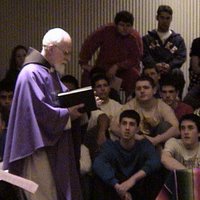
It bears repeating that the state of Catholic homiletics is appalling. It's pretty clear that Catholic seminaries don't spend much time preparing candidates to deliver high-quality homilies, in spite of the renewed focus that Vatican II put on them. Sacrosanctum Concilium, the V2 document on the Sacred Liturgy has this to say in paragraph 52:
By means of the homily the mysteries of the faith and the guiding principles of the Christian life are expounded from the sacred text, during the course of the liturgical year; the homily, therefore, is to be highly esteemed as part of the liturgy itself...
So does this make the homily a place for the priest to tell jokes, or to talk about Bible verses not from the reading or to spout random pieties? I don't think so. Given the abysmal state of Catholic understanding of the Holy Scriptures, the least the priest could do is to open the text that was just read, let it breathe a bit and explain the circumstances of the writer.
Some favorite examples of homiletic idiocy:
1) After reading from the gospel of Mark, the homilist preaches the version of the same gospel from Matthew, which has more of the details he wants to discuss.
2) A homilist gives a synopsis of the entire life of Christ, with unrelated asides about scholarly debates over the birthplace of Jesus. The asides are neither explained to the curious, nuanced for the fundamentalists, relevant to the homily nor related to the readings.
3) A homilist prone to "throwing bombshells" -- remarks that inflame but do not inform -- states that "The US Constitution is full of sin!" without at least qualifying his statement as to exactly which parts in particular are sinful.
4) A homilist turns his homily into a Q&A session in which he asks the assembly to imagine that Jesus just walked in and would answer any question put to him. The homilist then proceeds to "answer" these questions as Jesus, with short, trite answers that could hardly have passed the lips of the Son of God.
Perhaps I am being unfair. Priests work at a double disadvantage. First, many of them are really not students of the Scriptures. They don't have the intellectual tools needed to break open the text and peer into the life circumstances of its authors. Secondly, neither do they have useful real-life experience. They don't cook for themselves, they don't have to deal with wives or children, and they have not had to struggle to gain prestige and experience. From age 26, they are "Father". Yet they never worked for the privilege, and most do little to earn the right to that title after ordination. No wonder that homilies are so tepid: priests don't understand the Scriptures and they are ill-equipped to apply them to circumstances of their people.
But the assembly colludes in this as well. The priest who truly challenges his flock to follow the gospel message is considered "political" or "radical" or "liberal." Without support, such a homilist will soon start toning down his message to inane pieties and cryptic sentiments that can mean anything.
The solution should be apparent from the discussion above. Homilists must know the world of their assembly. They must be students of the Scriptures. They must hold fast to the direction of Sacrosanctum Concilium that the homily is the Word of God, not a joke session. And assemblies must expect to be challenged and inspired by God's Word, not coddled or lulled to sleep.
If I were a betting man, I'd play the ponies. Better odds.
_____________________________________________________________
Photo from http://maristretreathouse.com/photo-gallery/chapel-homily.html. Students at a retreat in Esopus, New York listen in rapt attention. Or did the homilist lose his page again?

No comments:
Post a Comment